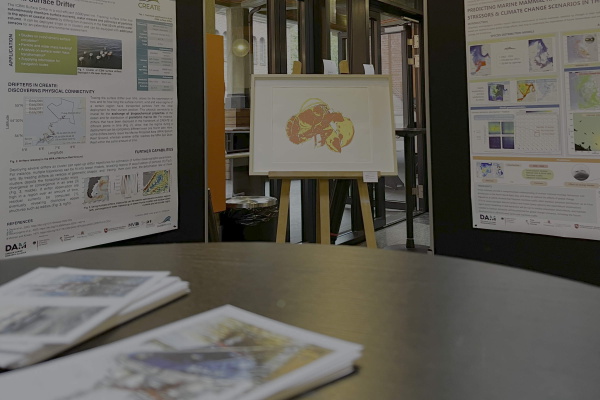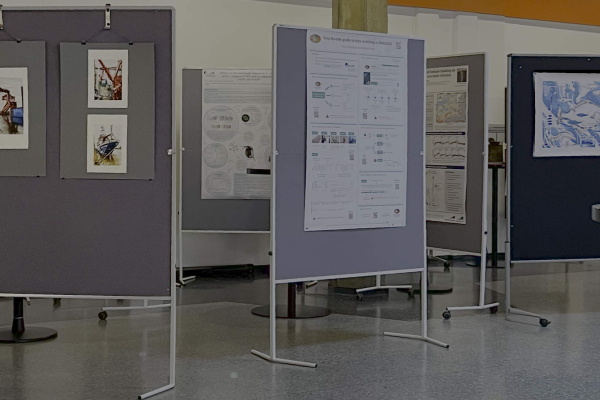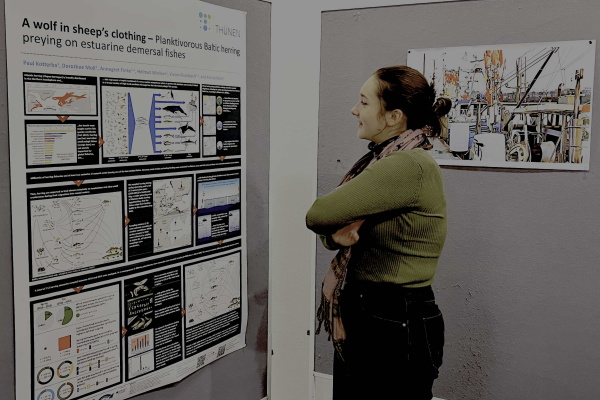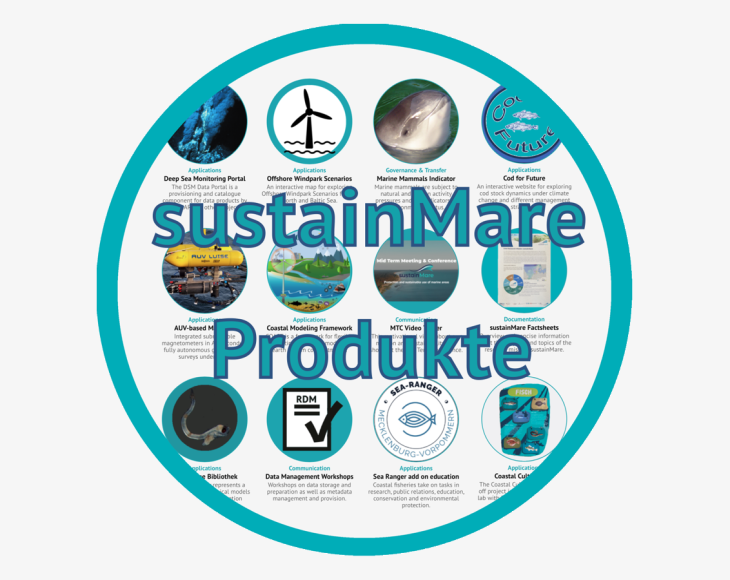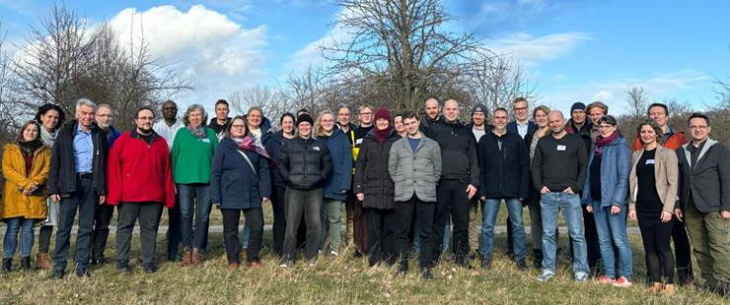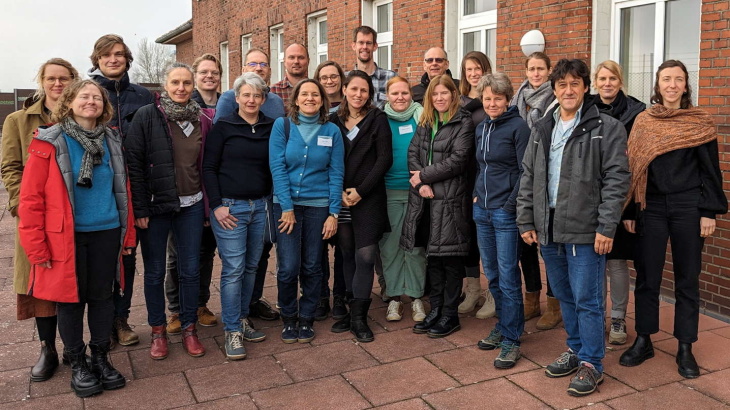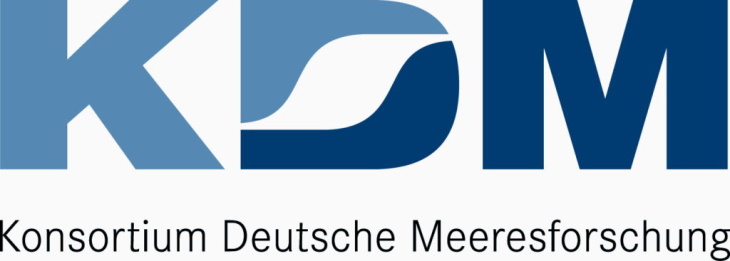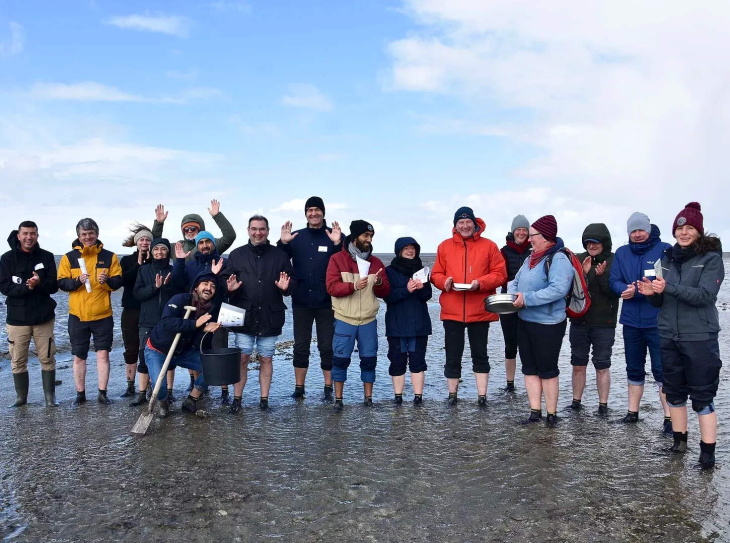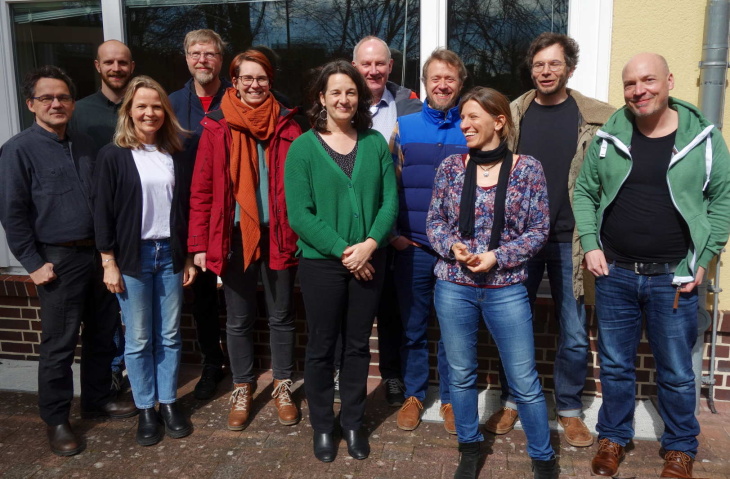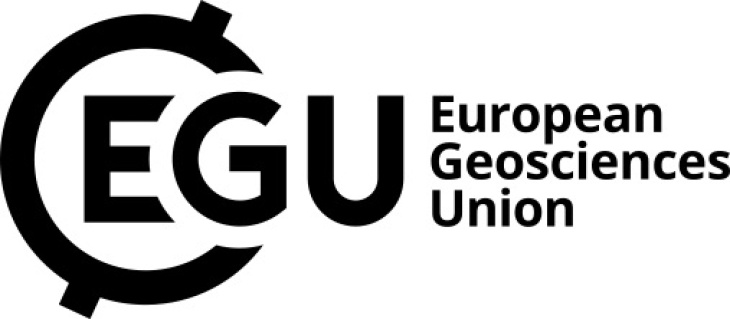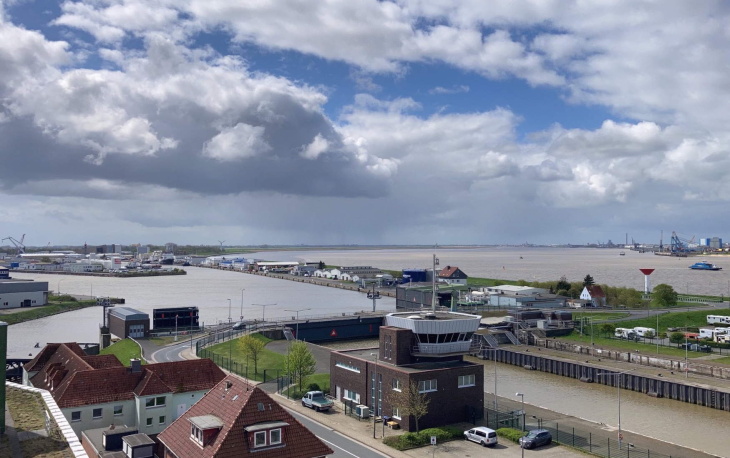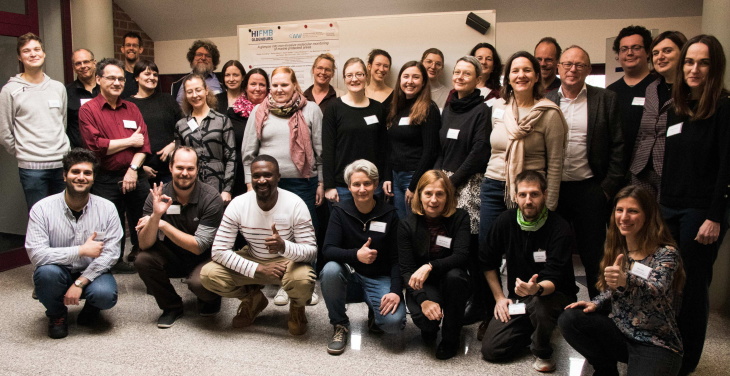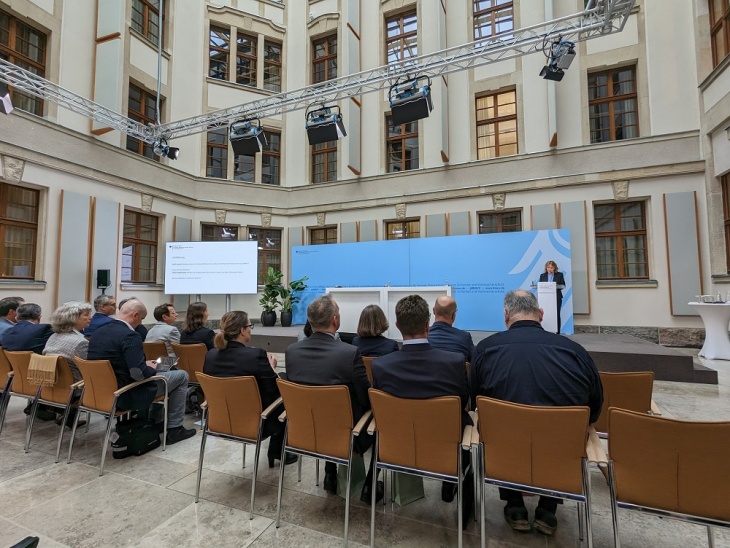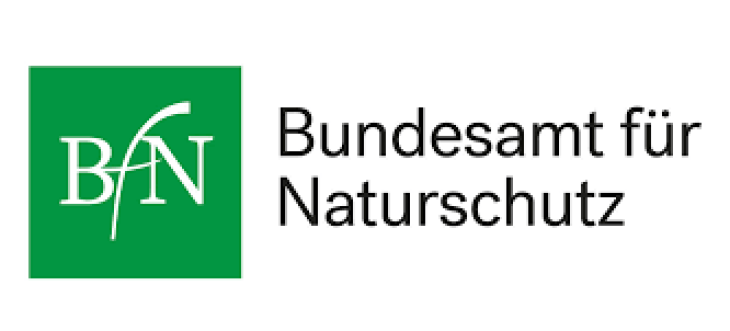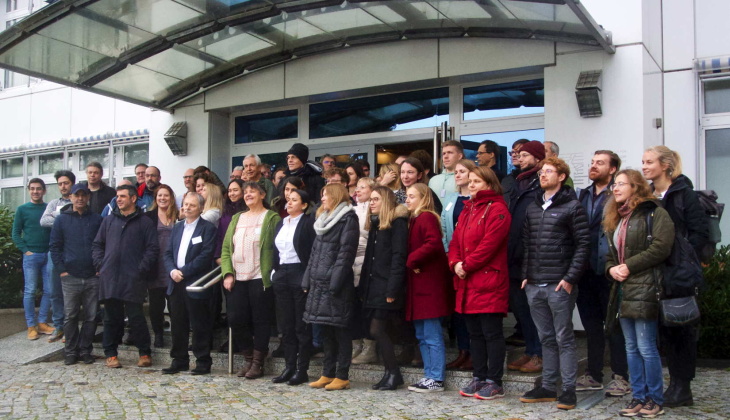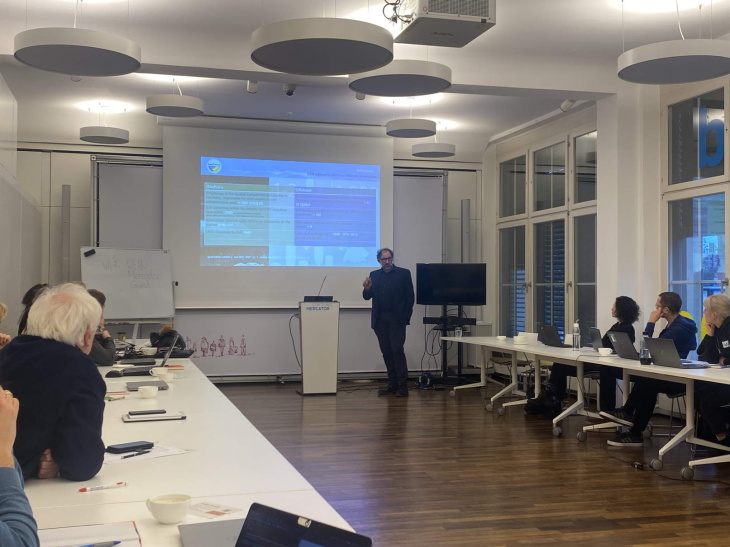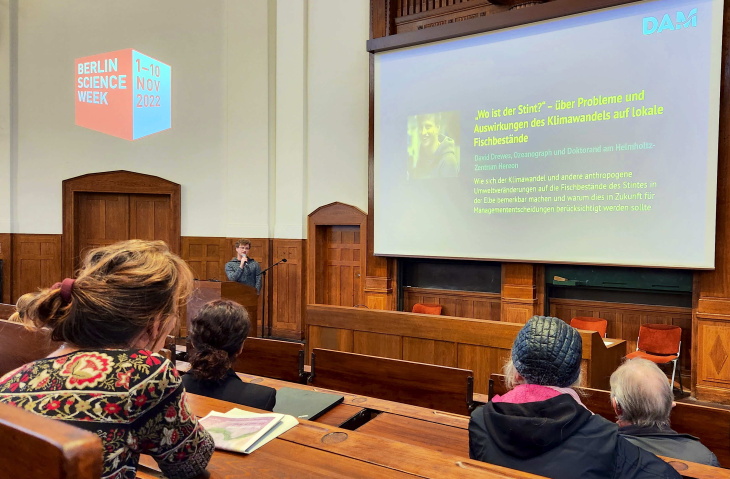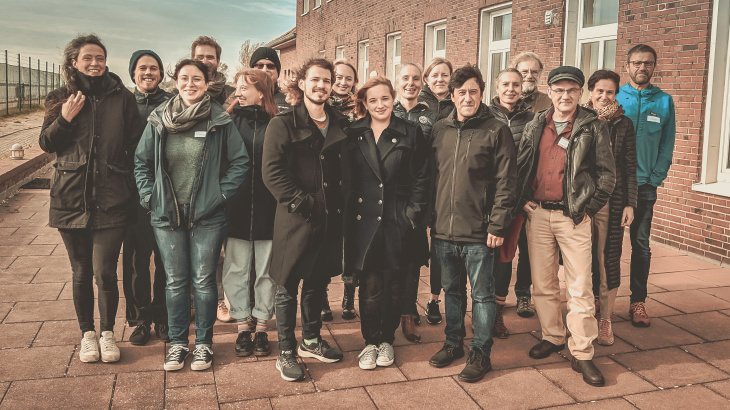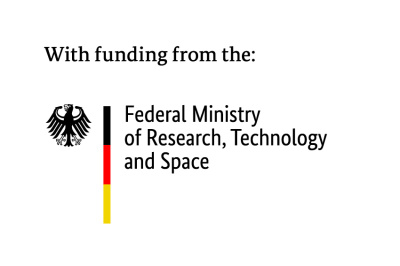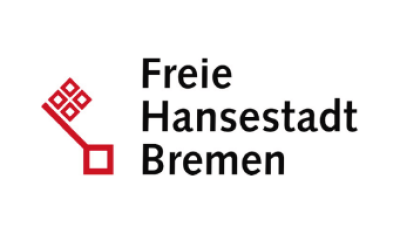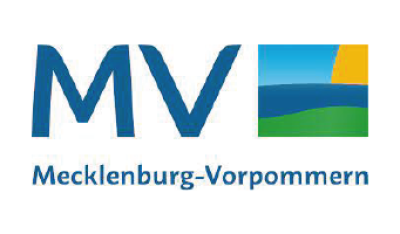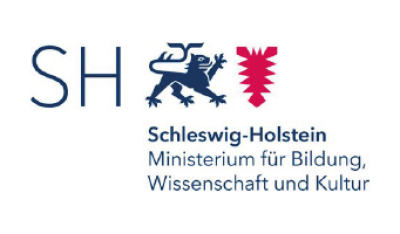Breaking News
sustainMare Newsletter
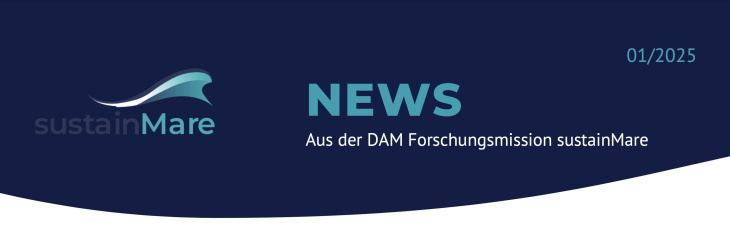
Finally: the first ever sustainMare Newsletter!
sustainmare Newsletter in English (4,5 MB)

There is a lot to report from the sustainMare research mission. Here at News & Events, reports of the individual projects and important events of the mission are presented. Our aim is is to bring more transparency to the research project and thus reflect the work to the general public. This is very important for us, as we want to develop versatile innovations for the protection and sustainable use of the oceans and make know-how accessible.

Last MGF-O cruise
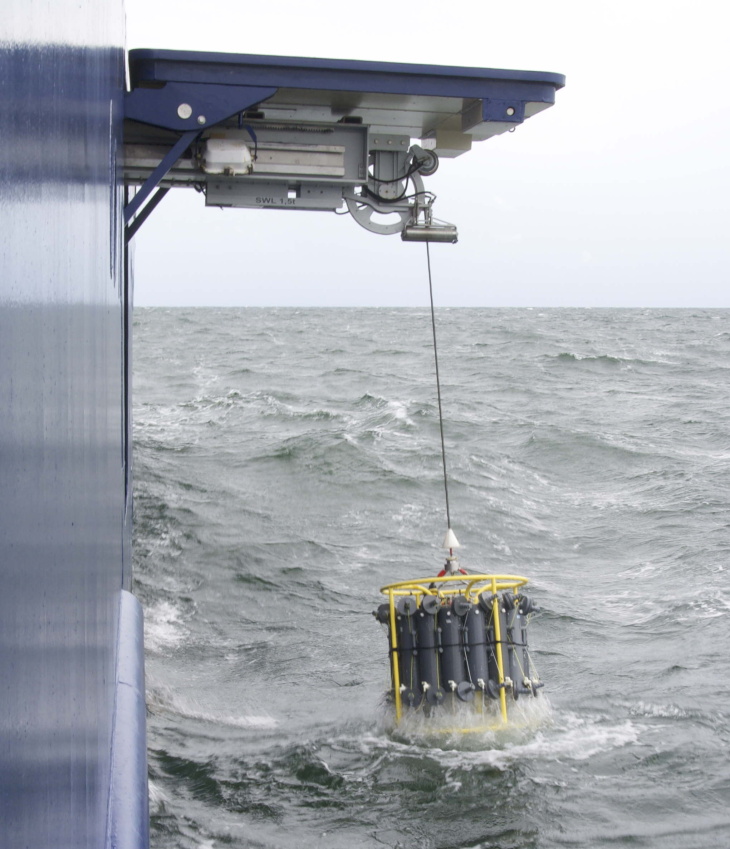
© K. Hoppe
The Elisabeth M. Borgese set sail for the last cruise of the sustainMare
pilot mission MGF-Ostsee on 23rd of January. Incidentally, it is the first
cruise after the ban of mobile groundtouching fishery (MGF) in parts
of the Marine Protected Areas in the German Baltic Sea.
The pilot missions end on 28th of February 2026.
tracking link
New article on Offshore Hydrogen Production
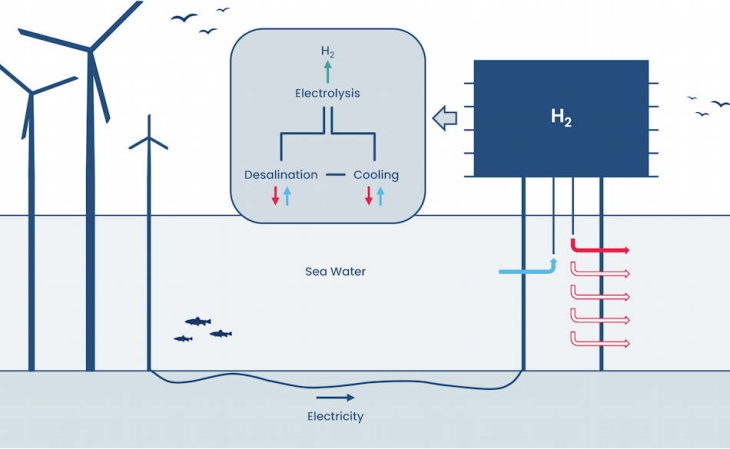
© Authors
Not directly a sustainMare outcome this article by Nils Christiansen et al is still of high relevance for our work.
Offshore production of hydrogen powered by offshore wind energy offers a promising alternative to fossil fuels. However, current technologies return waste heat and brine into the sea, raising questions of potential effects on local and regional hydrography. This study evaluates the hydrographic footprint of offshore hydrogen in the context of anthropogenic pressures from offshore energy production, focusing on a scenario for the German Bight.
link to article
Science Article on Fisheries Management
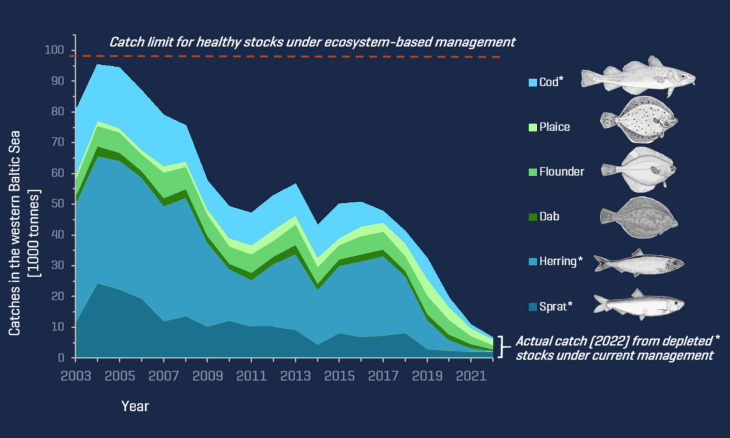
Total catches in the western Baltic Sea from 2003 to 2022
Illustration: © GEOMAR
GEOMAR researchers from the sustainMare project SpaCeParti (among others) analysed politically agreed-upon catch limits with a particular focus on the western Baltic Sea. They identified systemic weaknesses in EU fisheries management and call for quotas to be set independently of national interests.
Building on the already too high ICES (the International Council for the Exploration of the Sea) advice, the European Commission often proposed even higher catch limits, which the ministers in the EU Council usually approved, or sometimes increased further. As a result, official quotas permitted the capture of far more fish than the stocks could replenish. In some years even more than there were fish in the water.
Dr. Thorsten Reusch from GEOMAR stated: “It’s the small-scale coastal fishers who are suffering the most, often without having done anything wrong, except perhaps relying on fishing associations that lobbied for unsustainable quotas.”
to GEOMAR
sustainMare at the first National Marine Conference
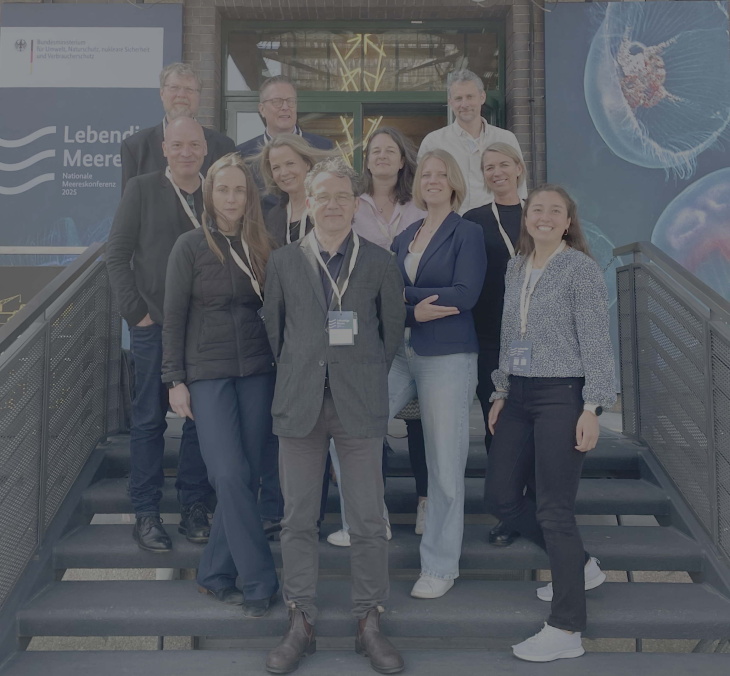
© sustainMare, W. Homes
The first National Marine Conference on May 6 and 7, 2025,
was attended by representatives from the Federal and State
Governments, from companies, associations, administrations
and the science community.
sustainMare was well represented, and mission speaker
Andreas Kannen was able to present our work in a so-called
“deep dive” on the topic of “Knowledge for Marine Protection”.
Dialogue event on marine munition in Brussels

© CONMAR
On 17 February 2025, the dialogue event ‘Munition legacies at Sea and the European perspective’ took place at the Permanent Representation of Germany to the EU in Brussels. The invitation was issued by the Federal Ministry of Environment, Nature Conservation, Nuclear Safety and Consumer Protection, Germany with the Ministry of Environment of Schleswig-Holstein.
The aim of the event was to bring together members of the European Parliament and the European Commission, representatives of governments, NGOs and scientists and other experts to discuss the challenges and opportunities associated with dumped ammunitions in European waters. Jens Greinert (GEOMAR) was invited to give a keynote speech on the latest scientific findings on the topic of munitions in the sea. Another participant from the CONMAR consortium was Matthias Brenner (AWI).
Good prospects for sustainMare
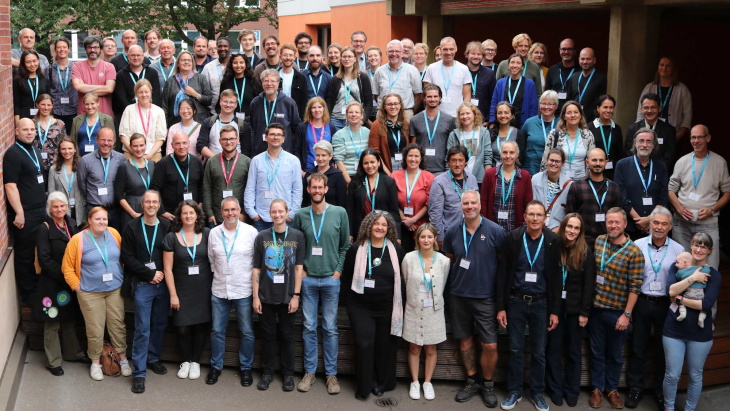
© sustainMare / S. Franzek
More than one hundred researchers and stakeholders took part in the annual “sJK” meeting of the DAM research mission sustainMare in Hamburg. To kick things off, the seven sub-projects presented their current results and an outlook for the second phase of the mission. This was followed by a guest lecture by David Reid on the potential of cooperation with the International Council for the Exploration of the Sea (ICES). In the afternoon, the participants got down to work: In cross-project break-out sessions of the future Mission Working Groups, the "Future of Fisheries" as well as "Marine protected areas and multiple use" were discussed. In the subsequent poster presentation round, the young scientists were particularly impressive with their results from the past two and a half years.
The second day began with a presentation on the often underestimated topic of “Research Data Management”. In the second phase, sustainMare will receive even more support in this area - a separate working group has been set up to benefit all projects. The following presentation dealt with multiple stressors in the marine ecosystem, which can reinforce or mitigate each other. This important aspect has so far been given too little consideration in the assessment of pressured ecosystems. The largest part of the day was again taken up by the parallel planning meetings of the working groups. In the first round, participants had to choose between the topics “Monitoring & Assessment” and “Co-Creation & Governance”. In the second part, there was a choice between “Climate Change” and “Offshore Wind Farms”. All break-out sessions laid the foundations for even more intensive, cross-project work in the second phase of the mission. The meeting concluded with a fish bowl discussion, which reviewed the last two days and the intensive planning meetings.
A special feature of this conference was the combination of the exhibition of scientific posters with some works of art by Sarah-Marie Kröger from Kiel and Lutz Hansen from Hamburg. They were complemented by impressions of fishing ports by Tobias Lasner. Sarah's bright pictures of research vessels and research work, for example, remind us of the special moments in a researcher's life when you get to swap the office for the cabin...
A special feature of this conference was the combination of the exhibition of scientific posters with some works of art by Sarah-Marie Kröger from Kiel and Lutz Hansen from Hamburg. They were complemented by impressions of fishing ports by Tobias Lasner. Sarah's bright pictures of research vessels and research work, for example, remind us of the special moments in a researcher's life when you get to swap the office for the cabin...
Exclusion of trawling in marine protected areas in the Baltic Sea

At last: a package of measures will strengthen the protection of sensitive habitats such as reefs and sandbanks in the marine protected areas of the German Exclusive Economic Zone of the Baltic Sea. Marine conservationists have been waiting for this news since similar restrictions on fishing in protected areas of the North Sea were implemented last February.
The exclusion is particularly good news for the sustainMare pilot mission MGF Baltic Sea, as it can now monitor the development of the protected areas without trawling.
to the BMUV press release (in German)
sustainMare Lecture Series 2024 (in German)
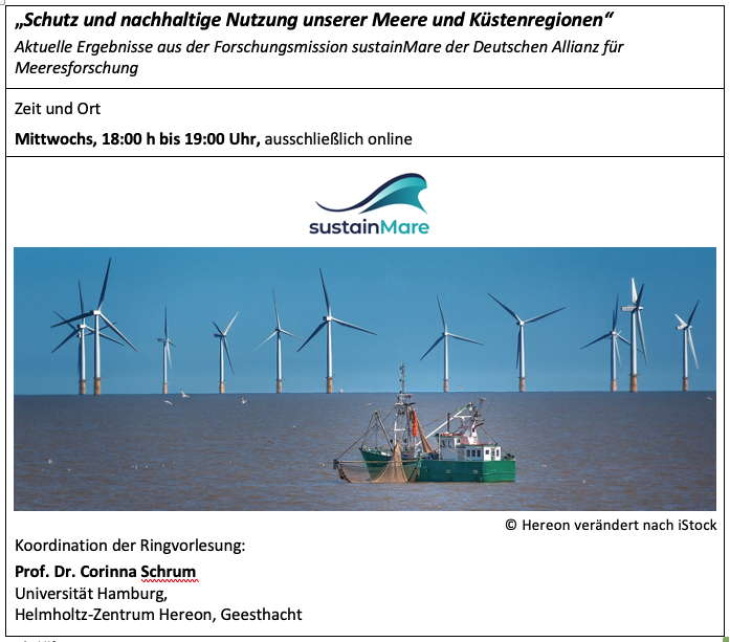
In the summer semester 2024, the second edition of the sustainMare Lecture Series takes place in the general lecture system of the University of Hamburg.
In addition, it was selected as an elective module for the extracurricular study program "Certificate Intercultural Competence", i.e. students from Hamburg University can have regular participation credited as academic achievement. The CIC is an extracurricular course offered by the University of Hamburg. The certificate is awarded to students of the University of Hamburg who are particularly involved in intercultural topics. It is a recognition of intercultural commitment and an additional award for students. And for us as well. However, our lectures are still in German only.
to Hamburg University
Munitions clearance - here we go!

© CONMAR
On June 24, 2024, an information day took place at GEOMAR as part of the information campaign for the start of the systematic clearance of munitions in the Baltic Sea, to which all interested parties were invited.
The sustainMare project CONMAR accompanies the Federal Government's
action program to pilot the recovery and destruction of munitions.
In the morning, almost 100 invited representatives of the federal government and the state of Schleswig-Holstein, medium-sized munitions clearance companies, sensor and software developers, large-scale industry such as ThyssenKrupp Marine Systems and German Naval Yards, representatives of the navy, the Schleswig-Holstein munitions clearance service, the federal police, non-governmental organizations and the scientific community - civilian and military, such as WTD71 - met to find out about the launch of the "Munitions salvage in the North Sea and Baltic Sea" emergency programme. Representatives of the entire affected Steakehodler portfolio came together for the first time at this event.

© CONMAR, J. Gehringer
In the afternoon, an exhibition format was presented to the interested public, with information stands on techniques and work relating to the topic of munitions and the exhibition "North Sea Wrecks" of the German Maritime Museum (DSM). There was also a series of lectures with various contributions, including talks by three CONMAR members on munitions, shipwrecks and toxicology.
to CONMAR
Large Baltic Sea field experiment with four research vessels

© IOW / R. Prien
On July 16, 2024, a 19-day research cruise will start in the Baltic Sea led by the Leibnitz Institute for Baltic Sea Research (IOW) to investigate the impact of bottom trawling on the seabed and the organisms living there. In addition to the IOW research vessel ELISABETH MANN BORGESE, three more research vessels from other institutions are involved in the large-scale bottom trawling simulation experiment near Warnemünde: the research vessel ALKOR from the GEOMAR Helmholtz Centre for Ocean Research Kiel, the research catamaran LIMANDA from the University of Rostock and the fisheries research vessel CLUPEA from the Rostock Thünen Institute of Baltic Sea Fisheries.
The experiment is part of the sustainMare pilot project MGF-Ostsee to study the effects of bottom trawling on marine protected areas in the Baltic Seas.
to IOW
New ICES Working Group

© Caroline Grünhagen, CeOS
The “Working Group for Ecosystem-based Fisheries Management in the Western Baltic Sea” (WGECOBAL) aims to better understand the impact of the environment and in particular climate on the living marine resources of the Western Baltic Sea, in order to supporting stock assessments and ecosystem-based recommendations for fish stocks. It will improve the assessment, advice and management of fish stocks in the western Baltic Sea. This is urgently needed, as the once most important commercial species cod and herring have collapsed. The aim is to develop and discuss possible future prospects for the ecosystem of the western Baltic Sea, its fish community and the fisheries that depend on it. The results will be passed on to the relevant decision-makers as part of WGECOBAL's work.
WGECOBAL will deliberately take a holistic approach and incorporate a broad expertise in related marine natural and social sciences. Sounds familiar? No wonder, because the group's chairs Prof. Dr. Christian Möllmann and Dr. Heike Schwermer work in the sustainMare project SpaCeParti. And researchers from iSeal are also involved in the work of WGECOBAL. In total, the working group pools the expertise of more than 30 researchers from Denmark, Sweden and Germany.
Link to ICES
Coastal Summer School 2024
This year's Coastal Summer School features the DAM project sustainMare and will take place from 02. - 13. September 2024 on the island of Helgoland. The focus is on the topic "Offshore Windfarms: innovative and sustainable options for multiuse concepts?" The target group are Msc grades, Phd students and young researchers already working in the field.
The coastal summer school is realized in cooperation of some of the leading national centres for coastal research in Germany: Leibniz Institute for Baltic Research Warnemünde, Helmholtz Centre Hereon Geesthacht and Alfred Wegener Institute for Polar and Marine Research (Helmholtz Association of German Research Centers).
Sorry, the registration is closed.
to the webpage
Facing the future: Is sustainable ocean management possible?
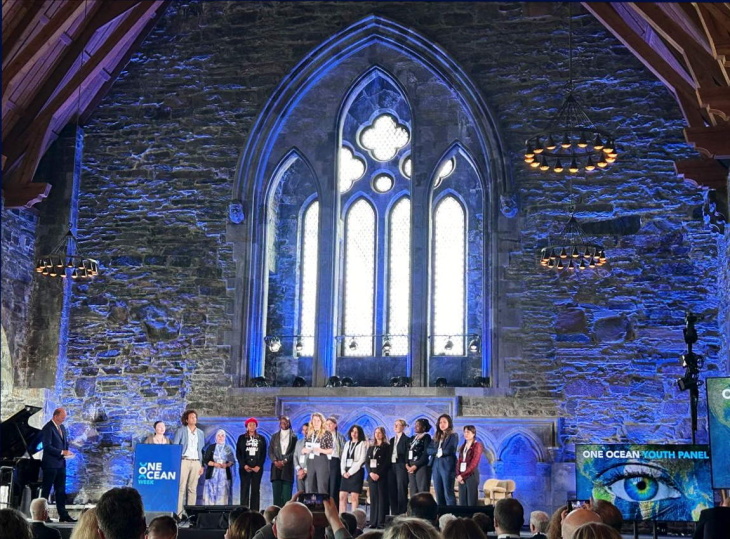
© oneoceanweek.no
At the kick-off event for decision-makers and stakeholders as part of the One Ocean Summit in Bergen, Norway, this question was generally answered in the affirmative. However, the challenges were also pointed out, e.g. that space in the North Sea is a finite resource (Prof. Ignacio Herrera Anchustegui), and that the consequences of the planned expansion of offshore wind energy by 2050 will be enormous and are still largely unknown (Prof. Corinna Schrum from CoastalFutures).
The panel also discussed the principle of sustainability and made it clear in the discussion that sustainability is more than "just" nature conservation. The generation of clean and affordable energy, food production and climate protection are also part of the UN's sustainable development goals.
The event took place in Håkons Hall, Norway's first castle dating back to 1261.
to oneoceanweek.no
Report on impacts of Offshore Wind Farms
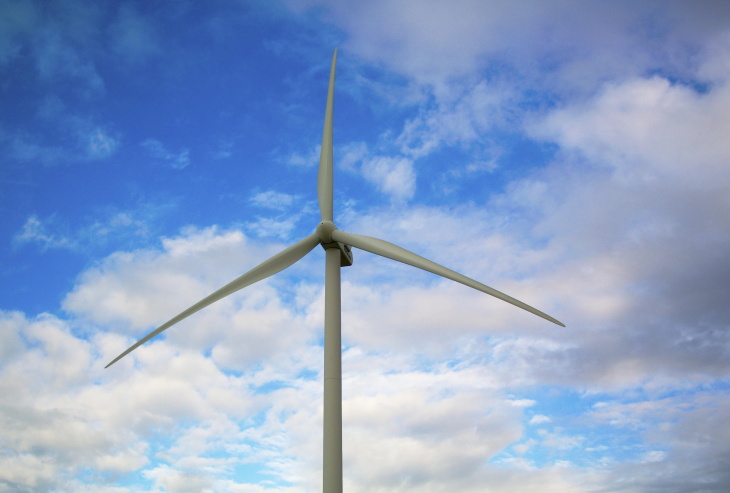
© K. Hoppe, hereon
sustainMare scientists were commissioned by the German Bundestag and the Office at Technology Assessment at the German Bundestag (TAB) with a current report:
"Effects of large offshore wind farms on the overall ecological-economic relationships in the North Sea and Baltic Sea"
Congratulations to the researchers from Hereon, Thünen, TiHo and DDA! The expertise for the report is of course based on more than the knowledge gathered in sustainMare, but is bundled in our joint project CoastalFutures. This news fits in well with the previous one and demonstrates the increasing interest of politicians in the topics of our research mission.
to the TAB project page
Sea Ranger pilot project
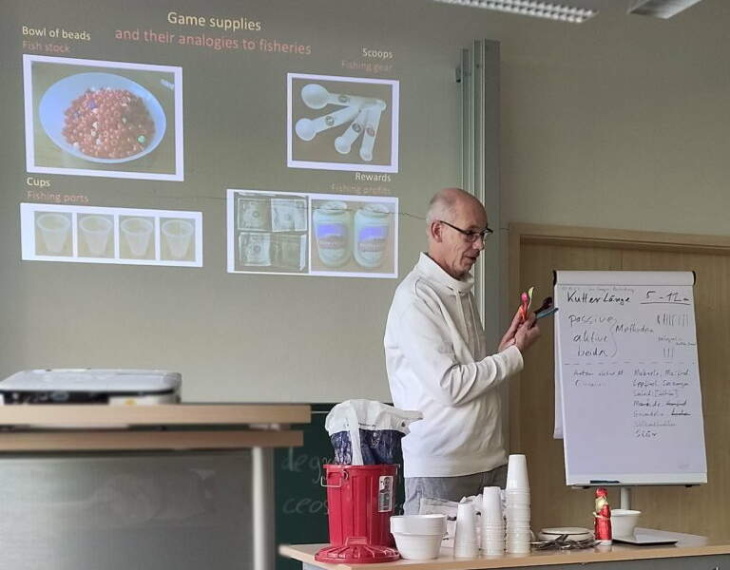
© SpaCeParti
Lately, one of the sustainMare products (see next news items) has been prominently in the German press. A sustainable idea for adapting the fishing profession in the western Baltic Sea to current circumstances (overfishing, climate change, biodiversity loss/change) comes from the Wismar Bay fishing cooperative. For this purpose, the Sea Ranger concept was devised, which the sustainMare project SpaCeParti is supporting and helping to shape.
The aim is to diversify the fishing profession and to take on tasks in nature conservation, public relations and ecosystem management in cooperation with authorities and research. 11 fishermen are currently taking part in the additional training program at the Sassnitz vocational college.
sustainMare products
We have a new webpage about the acchievements
of the mission, online since December 2023.
A big Thank you! to the Hereon Communication
and Media Department for their support.
to the webpage
Food web pilot study published in QSR 2023
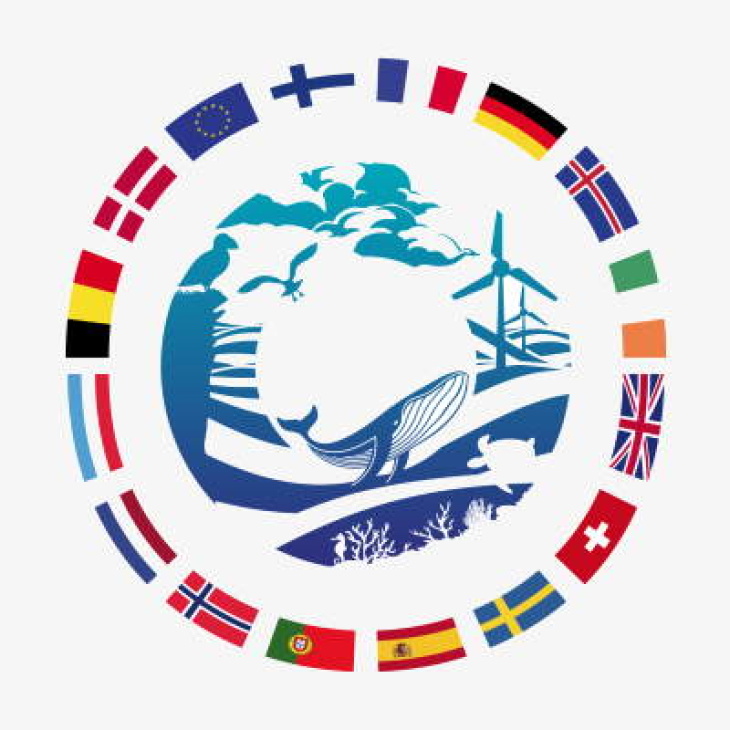
QSR 2023 Logo © OSPAR
Results of the sustainMare project iSeal were successfully transferred into marine policy.
As part of the OSPAR Quality Status Report 2023, a pilot food web assessment by means of Ecological Network Analysis (ENA) was developed together with France, Sweden, Denmark and Portugal. iSeal has contributed to this pilot study with an analysis of a coastal North Sea food web.
All direct and indirect interactions in a food web can be analysed in an ENA and the structure, functioning and ecological status can be assessed with ENA derived indices. The food web of the coastal North Sea comprises 235 marine species and has been modelled over a period of 10 years. Due to high pressures on the food web, the ENA indices show that the food web is not in a good environmental status.
The QSR is produced every 5-7 years and aims to assess the environmental status of the North-East Atlantic and to identify actions to achieve the OSPAR´s vision of a clean, healthy and biologically diverse Ocean, which is productive, used sustainably and resilient to climate change and ocean acidification. In addition, the results of the QSR 2023 may be used by EU Member States to support their reporting obligations under the Marine Strategy Framework Directive (MSFD).
the pilot assessment is available here:
Development of an ICES Roadmap for Offshore Wind Energy Research
The need for marine renewable energy has become more pressing in recent years due to the increasing demand for sustainable and clean sources of energy. Alongside the transition to clean energy to achieve the goals of the Paris Agreement, reducing energy imports is another driver in most ICES Member Countries and beyond pushing marine renewable energy developments specifically since the beginning of the Ukraine war. Within Europe, these developments (including wind, wave, and tidal) have been steadily increasing over the last two decades, and globally, trends are following. As the push for offshore renewable developments increases, exemplified by the Ostende Declaration of North Sea states pushing for a tenfold increase from currently 30 GW of installed capacity to more than 300 GW, ICES foresees an increase in advisory needs specifically relating to this development. Similar developments are expected in other ICES coastal areas, which poses a challenge on assessment, advice and marine science in general.
Therefore, with a Workshop on Offshore Marine Renewables (WKOMRE) and subsequent follow-up meetings, ICES started to develop a roadmap for research on impacts of offshore wind farms on ecological processes and the state of ecosystems, on impacts for fisheries and fisheries surveys and impacts on other marine activities within ICES Member countries and within the ICES system of expert groups. This roadmap is expected to be refined and adapted iteratively over time.
CoastalFutures has been involved in WKOMRE and the development of the ICES Roadmap from the beginning, contributing specifically from a modelling perspective and providing modelling results in related expert groups, as well as from a policy and social science perspective and the ICES Expert Group on Marine Planning and Coastal Zone Management (WGMPCZM). Thereby, CoastalFutures acts also as a bridge between the ICES roadmap (and ICES Expert Groups) and sustainMare. Furthermore, CoastalFutures and many other partners in the research mission are actively contributing to a wide range of ICES Expert Groups linking sustainMare research to the ICES research and advice agenda.
to ICES Library
"Future Workshop Coastal Fisheries 2045" in Germany
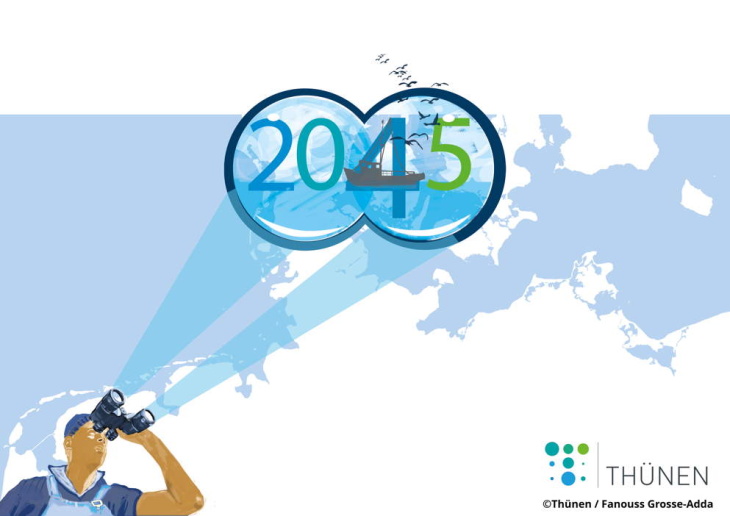
© Thünen / Fanouss Grosse-Adda
Under the title "Coastal Fisheries 2045 - First Target Picture of the Future Workshop" a new article has been published (in German). Here, Tobias Lasner from CoastalFutures and Fanny Barz describe their work in the "Future Workshop on Coastal Fisheries 2045", initiated by the Thünen-Institute of Sea Fisheries and Thünen-Institute of Baltic Sea Fisheries. The method used is a renewed, participatory scenario technique adapted to fisheries research for the development of desirable target images.
A panel of fisheries entrepreneurs and opinion leading experts from fisheries research, nature conservation, local politics, (coastal) tourism, marine spatial planning, recreational fishing and seafood trade developed target pictures for the use of the German seas for the year 2045 in several consecutive sessions, which were graphically realised by illustrators. The target pictures have in common, that they initially target the regeneration of marine ecosystems and stable fish stocks. In the target pictures, coastal and cutter fisheries become an integrative component in a marine multi-use scenario of renewable energies, tourism and nature conservation.
This work took simultaneously place with the sustainMare research mission. All seven projects of the mission have a focus on the "Future of Fisheries" in addition to their other topics. With good reasons the Thünen-future workshop will cooperate closely with the sustainMare research mission in future.
to the article
ICES and sustainMare in Bilbao
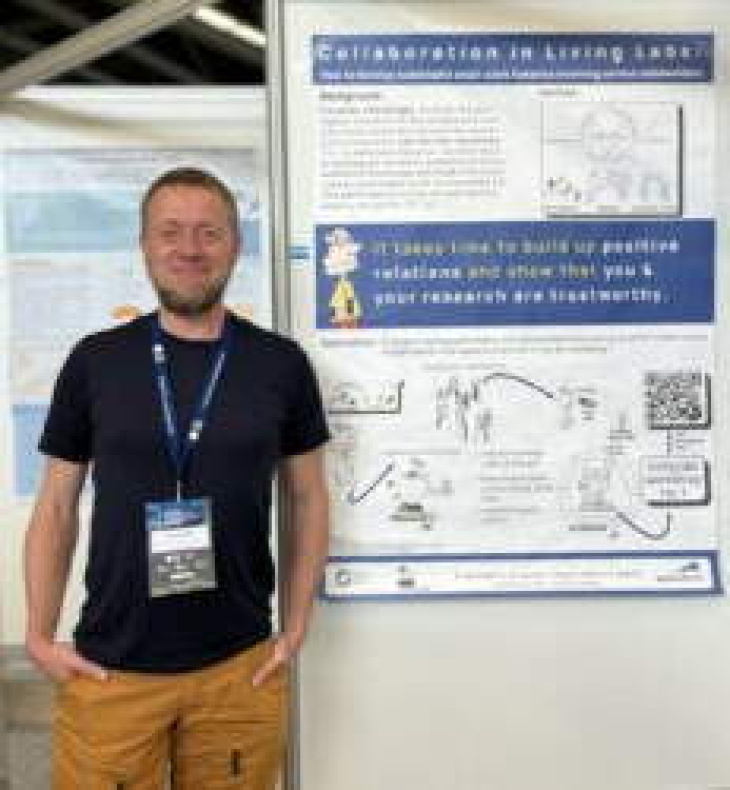
Poster session, © SpaCeParti
The ICES Annual Science Conference 2023 took place from 11–14 September 2023 in Bilbao, Spain. sustainMare with its strong focus on The fututere of fisheries in Germany was represented by several members of the mission projects SpaCeParti and CoastalFutures.
Link to the conference webpage
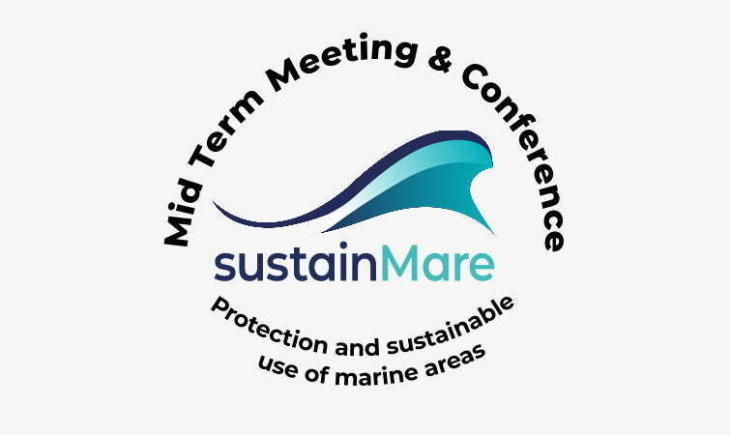
The sustainMare Mid Term Meeting & Conference took place 30.08. - 01.09.2023 in Kiel. It was a huge success with 190 participants from research, economy and administration. Important impulses were gained for the continuation of the mission, also beyond the first phase of sustainMare.
And the winner is ...
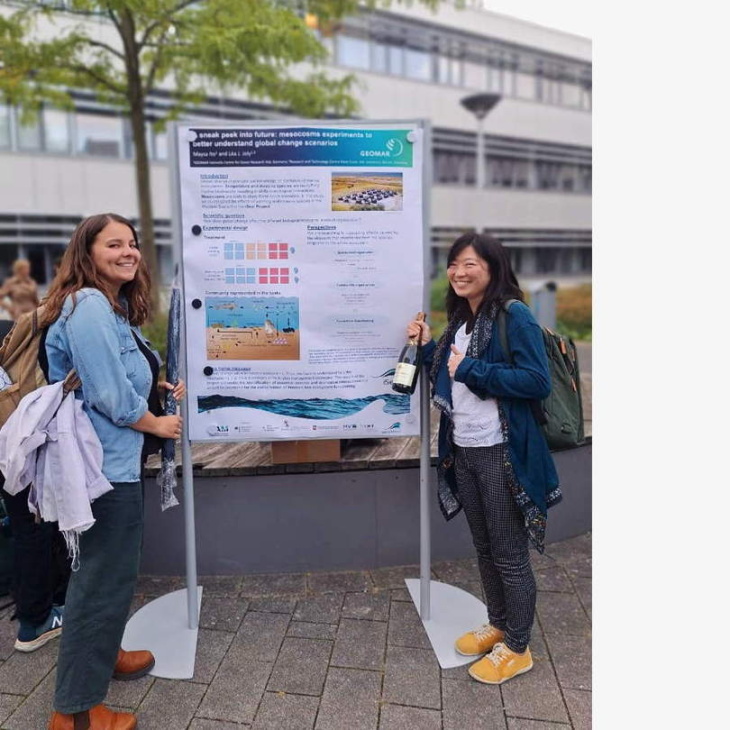
© Eva Papaioannou
iSeal wins poster award !
One of the highlights of the MTC was the Early Career Researcher
poster competition won by Dr Léa Joly (left) and Dr Maysa Ito (right).
The two young scientists presented the mesocosm experiments of
the iSeal project. The experiments were conducted to assess the
effects of ocean warming and invasive species on a benthic community
in the Wadden Sea. Analyses are conducted at various biological
and community levels, from the individual's physiological response
to the cascading effect on the functioning of the ecosystem.
Great interest in the PANGAEA info event
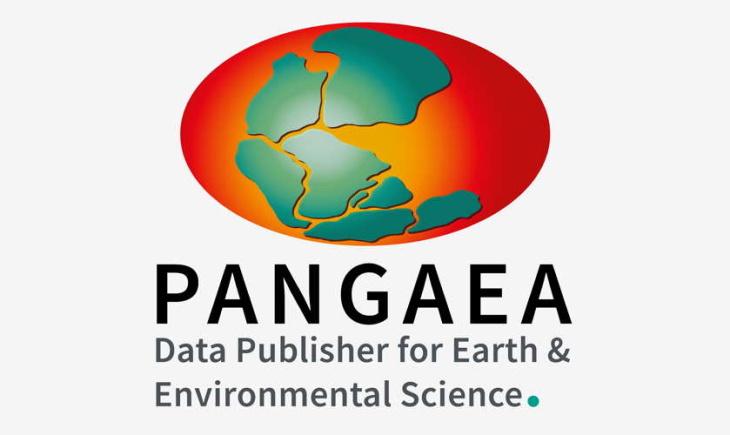
On 23 August 2023, the PANGAEA info event for the DAM research missions "How to publish data in PANGAEA, Data Publisher for Earth and Environmental Science" took place. The event was organised by Flavia Höring, the data editor for the DAM research missions at PANGAEA. 20 scientists from sustainMare and CDRmare attended the online session to learn more about the publication process at PANGAEA and discuss open questions regarding data archiving.
Link to PANGAEA
12th Future Conference Wind & Maritime Rostock
Prof. Dr. Corinna Schrum
Institute Director, Centre for Materials and Coastal Research
Helmholtz-Centre Hereon Geesthacht & Professor at the University Hamburg
Umweltauswirkungen von grüner Wasserstoffproduktion auf See (in German)
29. June 2023
Council of the Baltic Sea States meeting in Wismar June 1 and 2
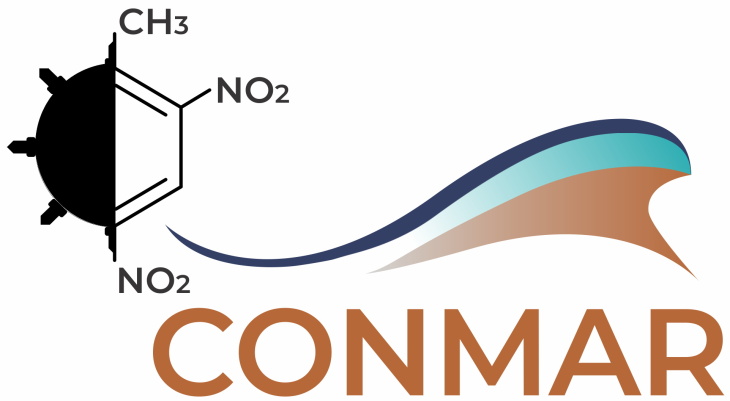
CONMAR toxicologists from Kiel University explain environmental hazards of dumped World War II munitions
At their meeting in Wismar, the foreign ministers of the Council of the Baltic Sea States agreed on closer cooperation in the salvage and disposal of munitions from the world wars that were dumped on the seabed. German Foreign Minister Annalena Baerbock wants investors in the construction of offshore wind farms in the Baltic Sea to participate in the salvage of munitions waste in the future. In the final declaration, the council members point out the dangers that conventional and chemical munitions pose to the marine environment, fisheries, shipping and renewable energy plants. According to estimates by the Fraunhofer Institute, there are up to 400,000 tons of conventional munitions and about 40,000 tons of chemical warfare agents in the Baltic Sea. The Institute for Toxicology and Pharmacology for Natural Scientists of the University Hospital Schleswig-Holstein under the direction of Prof. Dr. Edmund Maser provided essential insights into the environmental hazards of these toxic explosives in more than 10 years of research work.
CDRmare POLICY BRIEF
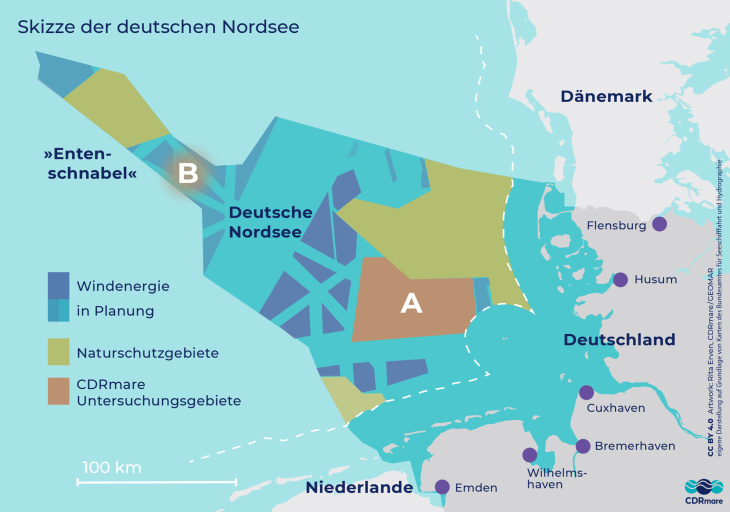
CDRmare untersucht Flächen in Nordsee. © R. Erven, CDRmare, GEOMAR
Opportunities and obstacles of marine geological CO2 storage.
"Are areas in the North Sea EEZ potentially suitable for a CO2 demonstration project?" This question and others are being investigated in detail in the GEOSTOR project of the DAM research mission CDRmare.
The CDRmare Policy Briefs address key statements and options for action that are of relevance to political decision-makers and other interested stakeholders.
to CDRmare info material
LECTURE SERIES
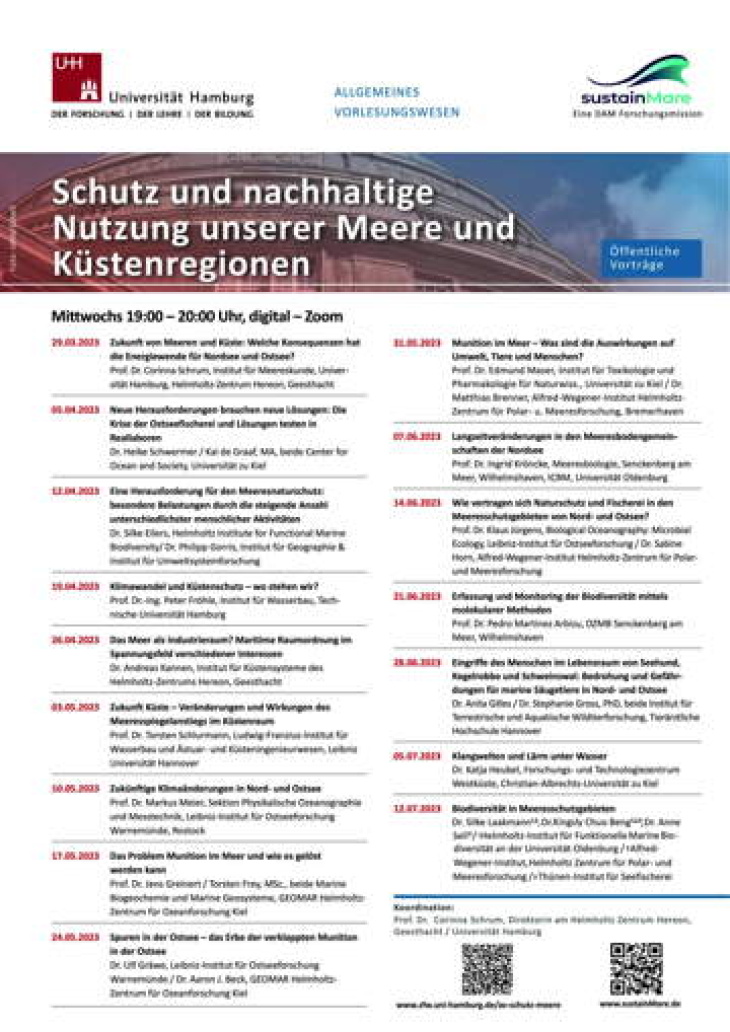
From 29.03.2023, every Wednesday at 19:00 h, you can join us for a public online lecture, courtesy of Hamburg University. A wide range of new and fascinating facts and stories from the sustainMare research mission.
However, please note that the lectures are in German!
link to HH University
sustainMare goes UN
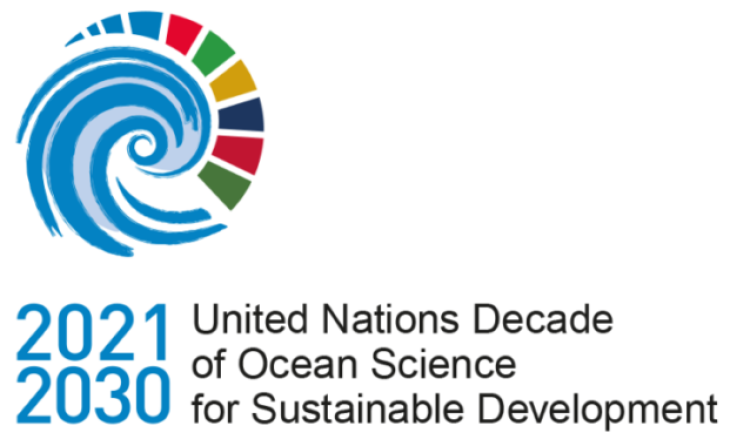
The research mission has successfully applied to be included in the der UN Oceandecade. sustainMare will be a project in the Decade Programme "smartNet" and work for the UN motto: "The Ocean we need for the future we want "
Summer 2023: Mid Term Meeting & Conference
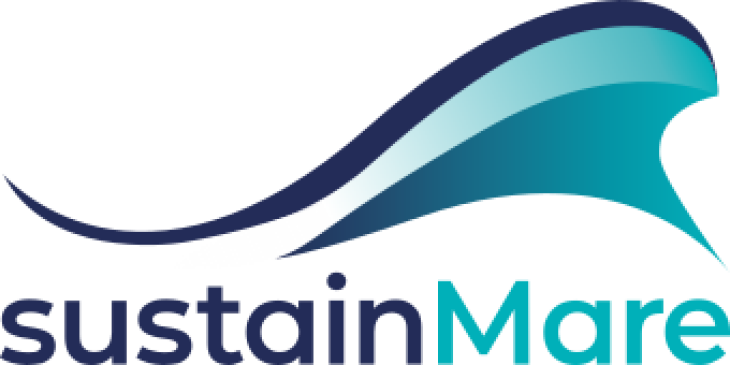
From August 30 to September 01, 2023, the sustainMare annual meeting will summarize, present and analyze the preliminra research results. Based on the meeting, the second half of the project will be planned, including preparations for an envisioned II phase.
Data on Marine Munitions
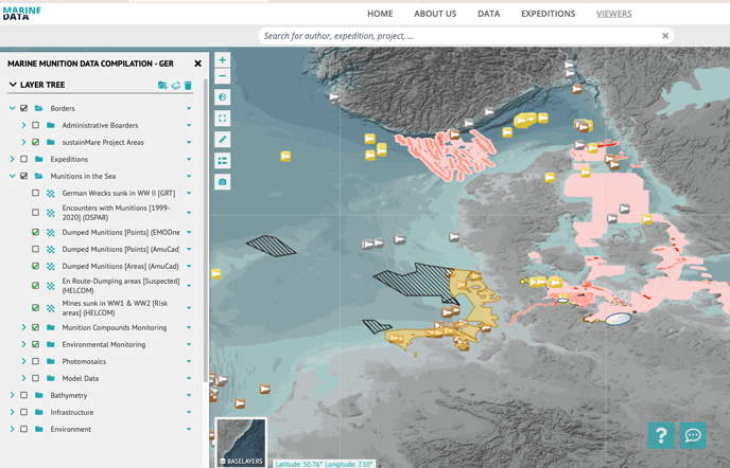
The Marine Munition Data Compilation - Germany as a CONMAR and sustainMare
data management product went online at the Marine Data Portal of the
German Marine Research Alliance (Deutsche Allianz Meeresforschung (DAM)).
Link
Making research tangible for pupils
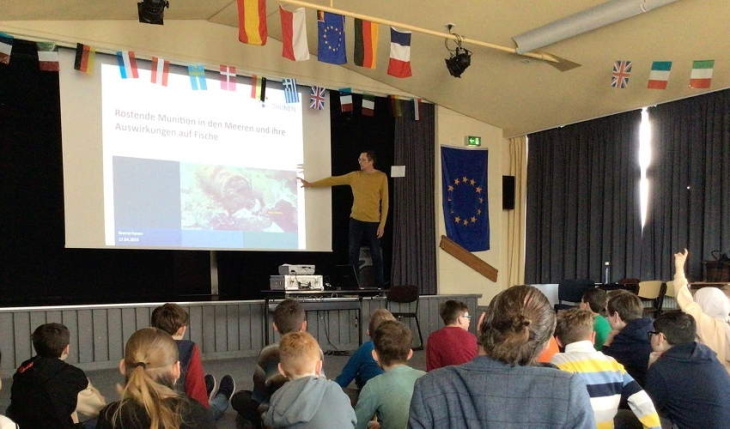
CONMAR is actively engaged in getting young people excited about research. As part of a cooperation with the Lloyds Gymnasium Bremerhaven, Dr. Jörn Peter Scharsack (CONMAR member at the Thünen Institute) gave a lecture for 7th graders on the topic of marine munitions contamination on April 17, 2023. The students were very well prepared and participated actively in the discussions on the lecture.
II. phase for pilot missions
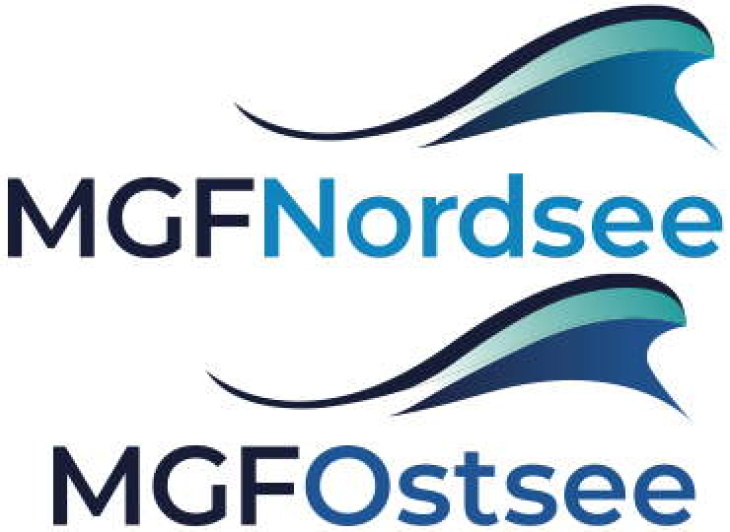
For three years the DAM pilot missions MGF Nordsee and MGF Ostsee ehave been researching the impact of mobile ground-touching fisheries (MGF!) on marine protected areas in the North and Baltic Sea. In March this year, a second phase was approved for both collaborative projects. This is good news for sustainMare, and fits well with the announcement of the approval of conservation measures by the EU Commission below.
EU Commission approves protection measures
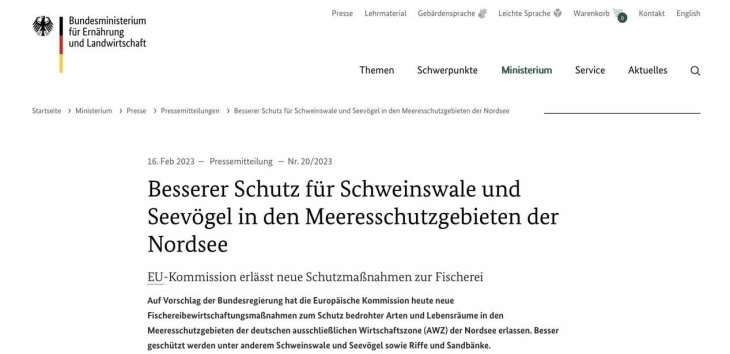
The time has come. On 16th February 2023, it was officially announced that the
EU Commission has approved the measures to restrict mobile, bottom-contact
fishing in the marine protected areas of the German North Sea. We are excited
to study the future developments in the areas and look forward to interesting
research questions.
CONMAR reaching out to the North Sea
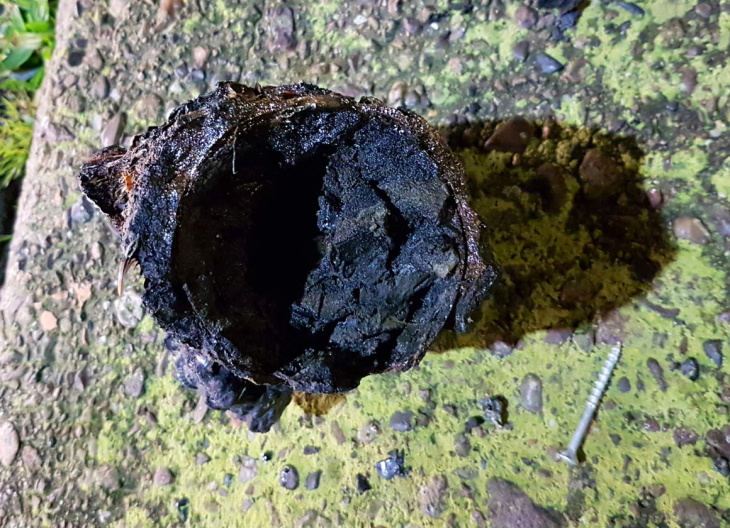
part of a 8.8 cm munition shell © CONMAR
First sampling of fish at outer Jade munition dump sites
According to archive research, enormous amounts of munition (>300 000t, amucad.org) were dumped in the Northern Jade estuary after WWII. Due to ongoing corrosion of the dumped munition, leakage of harmful munition compound to the marine environment is expected. The SOLEA cruise 816, January 16-27 2023 aimed at the historically first sampling of fish (common dab, Limanda limanda) and water samples for munition compounds in close proximity to the North Sea Jade area dumped munition.
Before the start of the cruise, crew members and scientific staff received a briefing from the Lower Saxony explosive ordnance clearance service. Experienced ordnance clearers explained how to deal with munition that might be picked up with bottom beam trawls and left containers for the storage of munition items on board. Due to heavy storm, the start of the cruise from Cuxhaven was delayed by one day. First sampling at Scharhörn reef was complicated by bad weather and half of the scientific staff being seasick. Sampling was continued at the outer Jade region near dumped munition and 30 dabs were successfully investigated and sampled for body fluids (blood, urine, bile) and tissues (liver, spleen, kidney, muscle, gill) for later laboratory chemical analysis for residual munition compounds such as TNT (trinitrotoluene).
Bad weather and technical problems forced the ship to search protection in the harbour of Wilhelmshaven. Due to high professionalism of the crew, the cruise was continued instantly and more sites around the Jade estuary and further west along the German coast up to the Ems estuary were sampled. On the way back to Cuxhaven, last sampling in the Jade estuary yielded a corroded chunk of munition, the bottom part of a 8.8 cm munition shell which contained residuals of the propellant, indicating the it was a dumped (not discharged) munition item (pic). Visible inspection of fish for diseases on board did not reveal any obvious health issues of dab collected near munition dump sites in comparison with control sites without dumped munition. Samples from water and fish were transferred to participating laboratories (AWI, GEOMAR, UKSH, Thünen) and are currently processed for chemical analysis of potential residual munition compounds. Laboratory analysis will reveal if and to which extend fish are contaminated with munition compounds.
more info at the CONMAR website
New book chapter on transdisziplinary Research by SpaCeParti
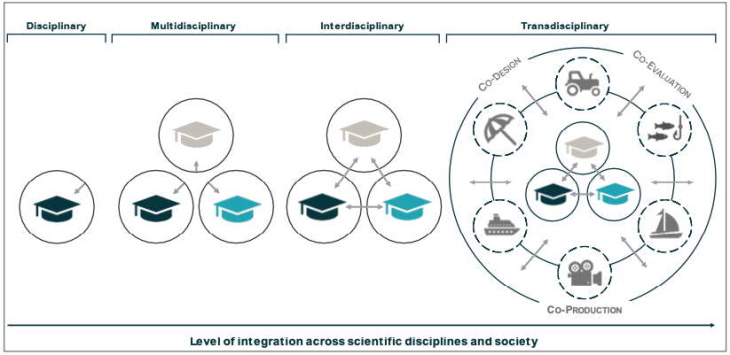
The multifaceted picture of transdisciplinarity in marine reseach
Transdisciplinary research is a growing field in academia, yet, there still is no uniform definition. The interdisciplinary team of the Center for Ocean and Society addresses this in the new publication.
Often, transdisciplinary research is contrasted to disciplinary, multi- and interdisciplinary research: while disciplinary research includes only one discipline, multi- and inter-disciplinary research includes several disciplines. However, the key difference of interdisciplinary research is the collaboration of all disciplines to achieve the objectives set within a particular project. Additionally, transdisciplinary research involves stakeholders from various backgrounds.

Event News
2nd BfN & CoastalFutures Workshop December 3-4, 2024
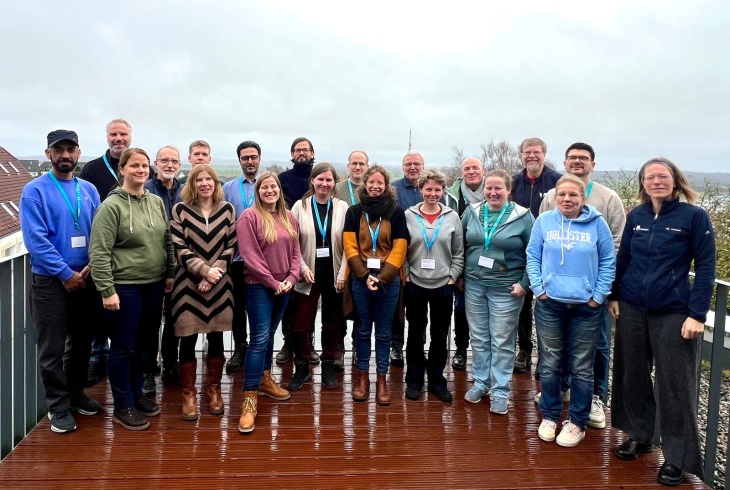
© Hereon
Within the CoastalFutures Project, the 2nd workshop with the German Federal Agency for Nature Conservation (BfN) was successfully organized and led by Dr. Ute Daewel from Hereon and Dr. Anita Gilles from TiHo. Held at the Media & Information Center (MIZ) in Bergen/Rügen, the workshop focused on how modeling scenarios could be of value for BfN regarding the management of marine protected areas (MPA)and support implementation of marine policies.
Discussions centered on key model outputs developed in CoastalFutures Phase I relevant for BfN, including outputs relevant for indicators for the EU Marine Strategy Framework Directive (MSFD), assessment criteria for the Habitats Directive, and baseline conditions at the Marine Protected Area level.
With the outlook on the Phase II of the CoastalFutures project, scenarios for offshore wind expansions were discussed with the BfN representatives and refined, including the potential exclusion of human activities and strategies for biodiversity protection.
Dialogue event: Munitions in the sea - science, pilot recovery and what next?

@pictures Stephan Röhl
DAM and NABU jointly hosted this event at the Futurium in Berlin to discuss with representatives of the parliamentary groups how to proceed following the pilot munition clearance recently launched in the Bay of Lübeck as part of "Sofortprogramm".
After welcome addresses by Dr Monika Fischer (BMBF) and Mr Dieter Janecek (Maritime Coordinator of the Federal Government for Maritime Economy and Tourism) two keynotes followed: Jens Greinert (GEOMAR) gave a first insight into the latest results of the monitoring accompanying the pilot clearance, which is being carried out by CONMAR. As well as Kim Detloff (NABU), who addressed the expectations of politics and industry after the pilot salvage from the perspective of NABU.
State Secretary Dr Christiane Rohleder (BMUV), Astrid Damerow MdB (CDU), Olaf in der Beek MdB (FDP) and Dr Sebastian Schäfer MdB (Bündnis 90/Die Grünen) took part in the subsequent panel discussion ‘From pilot salvage to large-scale munitions clearance in the German North and Baltic Seas’.
More information are available here.
CoastalFutures second annual meeting
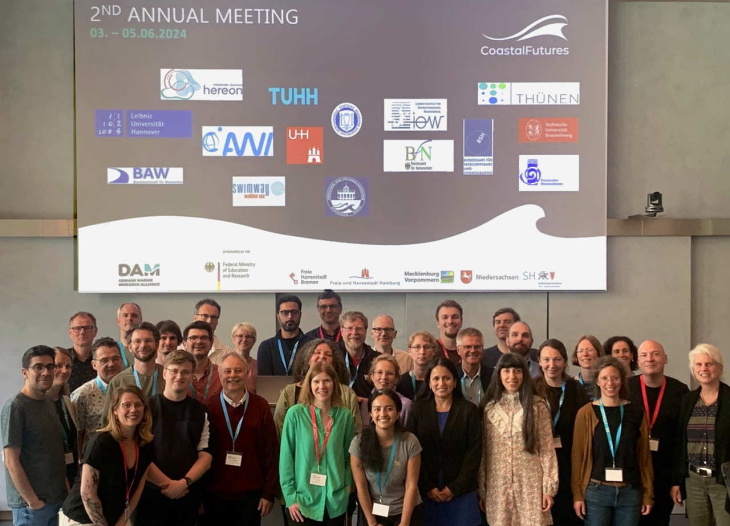
© Hereon
The meeting of the CoastalFutures project took place from 3 to 5 June at the Helmholtz Centre Hereon in Geesthacht. As a transdisciplinary project dealing with the impact of climate change on coastal regions, the CoastalFutures project presented its latest findings in various research areas.
The event focussed on the key topics of sand management, climate change and offshore wind energy (OFW). In addition, the meeting offered a deep insight into current research on "hydrogen at sea". The participants of the meeting had the opportunity to exchange views on the innovative modelling tools developed in the project to investigate future use scenarios and the impacts of climate change. In addition, holistic modelling methods developed to support the management and assessment of climate change impacts as well as use and protection measures were presented.

